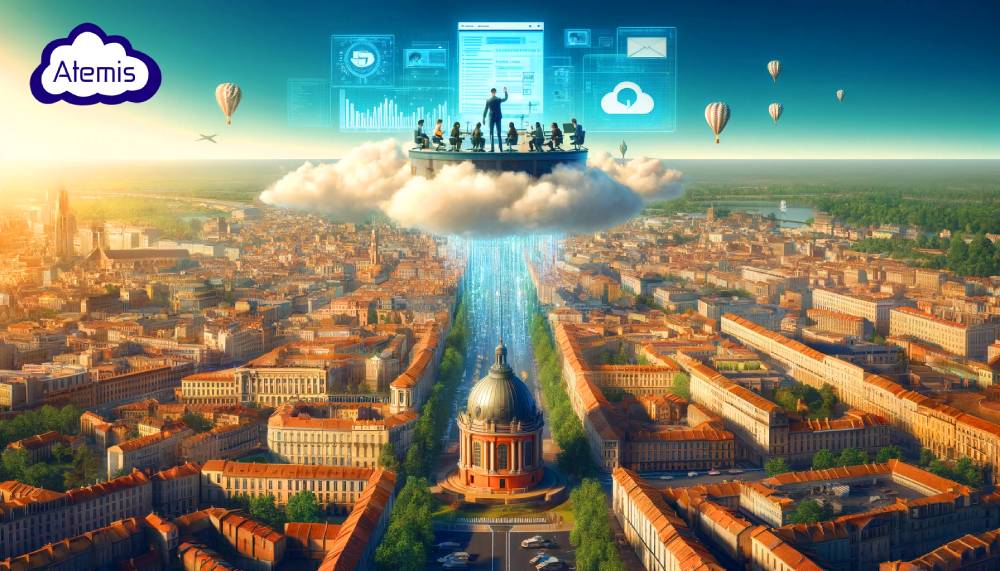AtemisCloud's Architecture and Great Work

By design, Atemis was built upon our customers' requests.
The year was 1998. AtemisCloud's journey began with its first customer, Bank Credit Lyonnais, seeking internal workflow applications. This initial engagement laid the foundation for what would become a vast and intricate architecture, refined over 25 years. As Societe Generale joined us for HR management and Thalatel came on board in 2000 for CRM and travel reservation systems, our client base started to grow, driven by a core philosophy: build features that are not just solutions for one but can be leveraged by many.
|
How to get your tailor-made business application?

In today's fast-paced business landscape, tailored solutions and customization capabilities are essential for driving innovation and maintaining a competitive edge. For C-level executives and VPs, finding a business application that aligns with the unique needs of your division or corporation is paramount. With over 25 years of experience, AtemisCloud offers a fully customizable, AI-driven, and scalable solution designed to meet the diverse requirements of various industries. This article explores how AtemisCloud differentiates itself from the competition and why it should be your go-to choice for a tailored business application.
|
How we revolutionized our marketing consulting company with AtemisCloud

New York City. The city that never sleeps, a sprawling urban jungle where dreams are made, and often shattered. It’s a place where the competition is fierce, and the pace is relentless. Here, in this bustling metropolis, my marketing consulting company found its home. As the owner of this 60-employee, three-office operation, I had long been searching for a tool that could handle the complex and dynamic needs of our business. Little did I know that AtemisCloud would become the lifeline that would revolutionize how we worked and thrived.
|
How to enhance your Marketing Automation with ChatGPT?

In the competitive world of digital marketing, the use of Artificial Intelligence has become an essential key to success. AtemisCloud, by integrating ChatGPT into its marketing modules, has taken a giant step towards innovation, providing its clients with both powerful and accurate tools to revolutionize their marketing strategies. This article explores the AI uses implemented at AtemisCloud, presents the benefits for the user companies, and invites all others to also take advantage of this integration.
|
Like a Dragon, grow and keep your wisdom in your hands

As we step into the Chinese New Year 2024, the Year of the Dragon, we are reminded of the profound wisdom and symbolism entrenched in Chinese tradition. The Dragon, a benevolent guardian of mankind, brings water, the source of life, symbolizing protection, prosperity, and the nurturing of existence. This year, let's draw a parallel to the modern corporate environment with AtemisCloud, embodying the Dragon's essence to nurture, protect, and cultivate the wisdom within your organization.
|
How can SaaS solutions enhanced by ChatGPT improve the skill sets of employees?

In the age of rapid technological advancement, the integration of Artificial Intelligence (AI) with Software as a Service (SaaS) is reshaping the business landscape. This evolution brings a significant impact on the workforce, especially across key departments like Marketing, Design, Sales, Logistics, Administration, Finance, HR, and After-Sales. While this might initially sound alarming, it's crucial to understand the transformative potential of AI and SaaS, as exemplified by platforms like AtemisCloud.
|
How to use AI and ChatGPT to revolutionize your marketing strategies?
 In the digital age, marketing has evolved from broad, generic strategies to highly personalized customer experiences. 1 to 1 marketing. This shift is largely driven by advancements in artificial intelligence (AI), which have opened new frontiers in how businesses interact with and understand their customers. Among the most groundbreaking of these technologies is ChatGPT, an AI tool that offers dynamic and intelligent capabilities in customer engagement and content creation. A real technological break. In this article, we will explore how the integration of AI, specifically ChatGPT, with innovative solutions like AtemisCloud, is revolutionizing marketing strategies, offering unprecedented customization, improve the quality and reduce drastically the costs for businesses of all sizes.
In the digital age, marketing has evolved from broad, generic strategies to highly personalized customer experiences. 1 to 1 marketing. This shift is largely driven by advancements in artificial intelligence (AI), which have opened new frontiers in how businesses interact with and understand their customers. Among the most groundbreaking of these technologies is ChatGPT, an AI tool that offers dynamic and intelligent capabilities in customer engagement and content creation. A real technological break. In this article, we will explore how the integration of AI, specifically ChatGPT, with innovative solutions like AtemisCloud, is revolutionizing marketing strategies, offering unprecedented customization, improve the quality and reduce drastically the costs for businesses of all sizes.
|
AtemisCloud celebrates its 25th birthday!
 In the fast-paced world of technology, where companies emerge and vanish like fleeting stars, AtemisCloud has quietly and persistently thrived, celebrating its 25th anniversary as a stalwart knight in the realm of the Cloud. For the business community and investors, this silver jubilee is more than a milestone; it's a testament to resilience, innovation, and unwavering dedication to customers.
In the fast-paced world of technology, where companies emerge and vanish like fleeting stars, AtemisCloud has quietly and persistently thrived, celebrating its 25th anniversary as a stalwart knight in the realm of the Cloud. For the business community and investors, this silver jubilee is more than a milestone; it's a testament to resilience, innovation, and unwavering dedication to customers.
|
Transforming Business Insights with AtemisCloud: Unleash the Power of Stunning Dashboards
 In today's fast-paced business landscape, data is the lifeblood of decision-making. Companies of all sizes rely on data-driven insights to stay competitive and agile. However, collecting and analyzing data can be a complex and time-consuming process, often involving multiple software solutions and data sources. This is where AtemisCloud shines, offering a comprehensive solution that empowers companies to create stunning dashboards, collect data from various tables in the same database, and turn raw information into actionable insights.
In today's fast-paced business landscape, data is the lifeblood of decision-making. Companies of all sizes rely on data-driven insights to stay competitive and agile. However, collecting and analyzing data can be a complex and time-consuming process, often involving multiple software solutions and data sources. This is where AtemisCloud shines, offering a comprehensive solution that empowers companies to create stunning dashboards, collect data from various tables in the same database, and turn raw information into actionable insights.
|
Catalyse the revenue growth and cost reduction for SME

Small and medium-sized enterprises (SMEs) are the backbone of many economies, contributing significantly to job creation and economic growth. However, SMEs often face unique challenges in a competitive business landscape, such as limited resources, tight budgets, and the need to do more with less. In this context, AtemisCloud emerges as a powerful tool that can provide SMEs with a much-needed leverage effect, enabling them to boost their revenues while simultaneously reducing costs.
|
 | Loading… |
     |